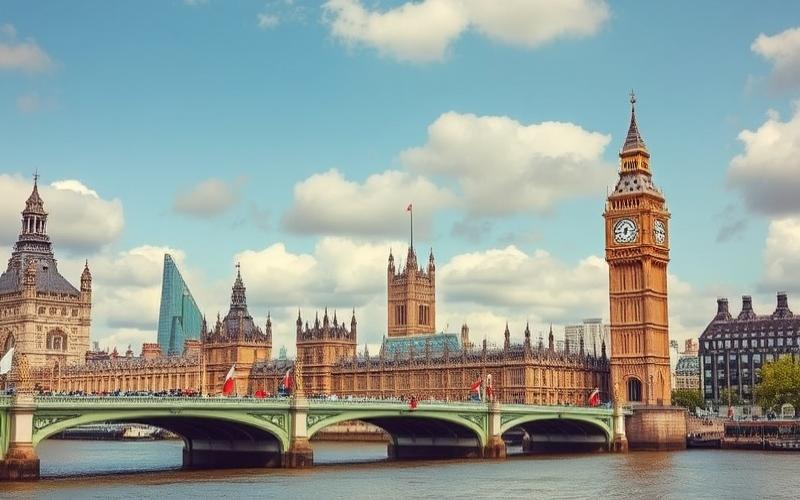
 Published on and written by Cyril Jarnias
Published on and written by Cyril Jarnias
The United Kingdom offers numerous opportunities for entrepreneurs looking to establish themselves in the country. Whether you’re seeking commercial space, an office, or a warehouse, it’s essential to thoroughly understand the UK property market and its specificities. This article will guide you through the key steps to finding the perfect premises for your business in the UK.
Secrets to Finding Hidden Gems
To find the ideal premises for your business in the UK, several options are available to you:
1. Specialized Real Estate Agencies: They often have extensive portfolios of commercial properties and possess thorough knowledge of the local market. Their expertise can prove invaluable for negotiating the best terms.
2. Online Platforms: Websites like Rightmove Commercial, Zoopla Commercial, or Realla offer numerous listings of professional premises for rent or purchase throughout the country.
3. Professional Network: Don’t overlook word-of-mouth and recommendations from your network. Some opportunities aren’t always publicly advertised.
4. Business Parks and Incubators: These dedicated business spaces often offer advantageous conditions for young companies in the development phase.
5. Local Agents: In some cities, independent real estate agents may have access to properties not listed on major national platforms.
Good to Know:
Before starting your search, clearly define your needs in terms of space, location, and budget. This will help you more effectively target opportunities that truly match your project.
Essentials of UK Commercial Real Estate
Here’s a selection of the main agencies specializing in commercial real estate in the UK:
- Savills: A major player with nationwide presence and recognized expertise.
- CBRE: An international company offering comprehensive commercial real estate services.
- Knight Frank: Specialist in high-end real estate, including professional premises.
- JLL: A global agency providing innovative solutions for businesses.
- Cushman & Wakefield: An extensive network covering all types of commercial properties.
These agencies typically have dedicated teams for different types of premises (offices, retail spaces, warehouses) and can assist you through all stages of your project, from search to lease negotiation.
Good to Know:
Don’t hesitate to contact multiple agencies to compare their offers and gain a broader view of the market. Some may have exclusive listings that perfectly match your criteria.
The Winning File: Essential Documents
To rent commercial premises in the UK, you’ll generally need to provide the following documents:
1. Business Plan: A detailed document presenting your business project, financial forecasts, and development strategy.
2. Bank References: A letter from your bank confirming your solvency and ability to meet financial commitments.
3. Company Accounts: If your company already exists, financial statements from recent years will be required.
4. Personal Guarantees: In some cases, the landlord may require personal guarantees from the director or shareholders.
5. Proof of Identity and Address: Official documents such as a passport and recent utility bill will be necessary.
6. Company Registration Certificate: The official document proving your company’s legal existence in the UK.
7. Professional References: Testimonials from business partners or clients can strengthen your application.
Good to Know:
Carefully preparing these documents before starting your search will allow you to react quickly when you find the ideal premises. In a sometimes highly competitive market, this responsiveness can make all the difference.
Rental Costs: What You Need to Know
Rental prices for professional premises in the UK vary considerably depending on location, property type, and quality. Here are some benchmarks:
Offices: – London (center): £650 to £1,200 per m² per year – Manchester: £300 to £450 per m² per year – Birmingham: £250 to £400 per m² per year
Retail Spaces: – London (Oxford Street): up to £2,000 per m² per year – Glasgow (city center): £200 to £350 per m² per year – Leeds: £150 to £300 per m² per year
Warehouses: – London area: £150 to £250 per m² per year – Midlands: £70 to £120 per m² per year – Northern England: £50 to £90 per m² per year
It’s important to note that these prices generally don’t include additional costs (business rates, insurance, maintenance) which can represent significant additional expenses.
Good to Know:
The UK commercial property market often uses “rent review” systems that allow for periodic rent adjustments, typically every 3 to 5 years. Make sure you fully understand the terms of your lease regarding these potential reviews.
Emerging Cities: Opportunities to Seize
While London remains the stronghold of the British economy, many cities offer interesting opportunities for businesses, with more affordable setup costs:
1. Manchester: The country’s second economic hub, experiencing rapid development, particularly in tech and media sectors.
2. Birmingham: Located in the heart of the Midlands, this city benefits from significant infrastructure and a skilled workforce.
3. Glasgow: Scotland’s largest city attracts numerous businesses thanks to its competitive costs and quality of life.
4. Leeds: An important financial center with a dynamic property market and attractive rents.
5. Bristol: Known for its innovative ecosystem, particularly in green technologies and aerospace.
These cities often offer modern office spaces, well-equipped business parks, and dynamic commercial areas at prices well below those in the capital.
Good to Know:
Some of these cities benefit from urban regeneration programs that may include tax incentives or grants for businesses establishing themselves there. Check with local authorities about existing schemes.
Support for Your Setup
The UK offers several schemes to facilitate business establishment in the country:
1. Enterprise Zones: These special zones offer tax benefits, simplified administrative procedures, and sometimes reduced rents for businesses setting up there.
2. Regional Growth Fund: This government fund supports job-creating projects in certain priority regions.
3. Small Business Rate Relief: A reduction in local taxes for small businesses occupying premises with low rental value.
4. R&D Tax Credits: Tax credits for businesses investing in research and development.
5. Local Programs: Many municipalities have implemented their own business setup assistance schemes, which may include grants or preferential rate loans.
It’s recommended to contact the Department for Business and Trade or regional economic development agencies for detailed information about available support in your business sector and target geographic area.
Good to Know:
Brexit has modified some European aid programs, but the UK government has implemented new schemes to maintain the country’s attractiveness for foreign investors. Stay informed about regulatory changes that could impact your project.
Finding the ideal premises for your business in the UK requires good preparation and thorough understanding of the local market. By following these tips and relying on experienced professionals, you’ll maximize your chances of finding the property that perfectly matches your needs and budget.
Disclaimer: The information provided on this website is for informational purposes only and does not constitute financial, legal, or professional advice. We encourage you to consult qualified experts before making any investment, real estate, or expatriation decisions. Although we strive to maintain up-to-date and accurate information, we do not guarantee the completeness, accuracy, or timeliness of the proposed content. As investment and expatriation involve risks, we disclaim any liability for potential losses or damages arising from the use of this site. Your use of this site confirms your acceptance of these terms and your understanding of the associated risks.















